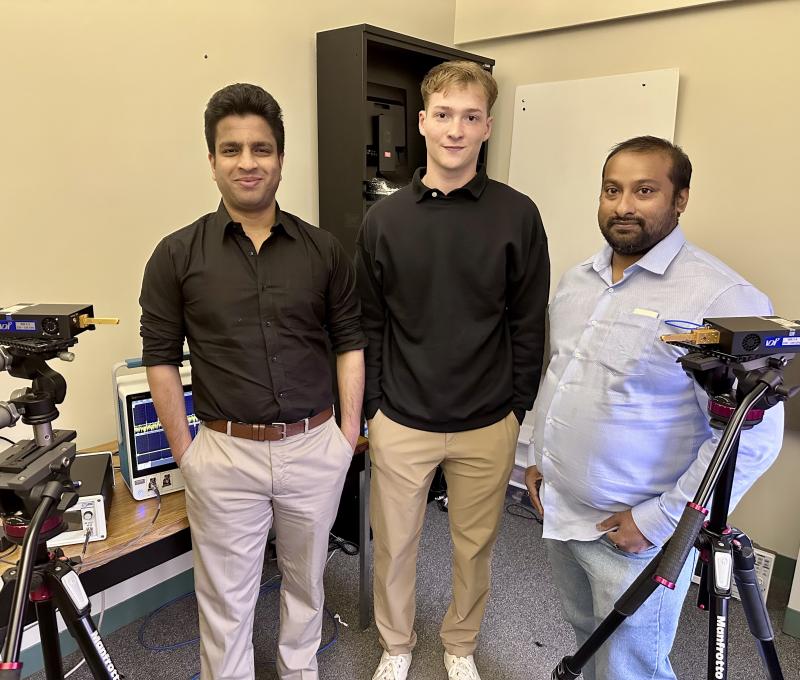SUNY Poly Senior Aaron Farley Co-Authors Research Publication in ‘Cells’

SUNY Poly Undergraduate student Aaron Farley, a senior studying Biology, has been credited as a co-author for a newly published article in a highly respected, peer-reviewed science journal, Cells.
This opportunity to conduct this exciting research arose when Aaron was studying in the 10-week "Summer Fellows" program at the Masonic Medical Research Institute in Utica, NY, with Dr. Lin, who led the study.
MMRI News Release:
Media Contact Only: Tony Gilbert
Phone: 315-624-7478
Email: Media@MMRI.edu
For Immediate Release:
September 21, 2022
New Genetic Finding Sheds Light for Congenital Heart Disease
VGLL4 Gene Isolated to Show Unique Role in Tissue Development
UTICA, NY — A new study led by the Masonic Medical Research Institute published in the journal Cells shows for the first time that a particular gene, called VGLL4, is required for embryo development but is dispensable for myocardial growth.1 This fact was previously unknown, and with this discovery, medical researchers now have useful new information about heart cell development, helpful for our understanding of congenital heart defects and heart failure.
Why this matters: Congenital heart disease is one of the leading causes of pediatric morbidity and mortality, which is why it is important to decipher the molecular mechanisms that control heart development. Cardiovascular development has become a crucial element of understanding congenital heart diseases, and the more we know about this, the better we can treat heart malformations.
Context: “Vestigial like family member 4” is a protein that is encoded by the VGLL4 gene; this is a transcriptional cofactor of VGLL family, found in many organs and tissues. VGLL4 has been pinpointed to be a tumor suppressor, and it has been thoroughly researched in cancer studies.2
Study summary: To understand the VGLL4 function in the heart, the authors generated two VGLL4 loss of-function mouse lines: a germline VGLL4 depletion allele and a cardiomyocyte-specific VGLL4 depletion allele. The analysis of the embryos revealed that VGLL4 knockout embryos had reduced body size, malformed tricuspid valves, but normal myocardium and normal heart function. Read the full article from Cells, linked here: https://doi.org/10.3390/cells11182832
What’s new here: This is a newly discovered function about VGLL4; this protein is needed for embryonic development, but that function is independent from and isolated from the growth of the heart’s myocardial wall.
Team authors: Caroline Sheldon, Aaron Farley, Qing Ma, William Pu, and Zhiqiang Lin. Dr. Zhiqiang Lin led the team, he is a Principal Investigator at the Masonic Medical Research Institute. The research team includes colleagues from Harvard Stem Cell Institute and Boston Children’s Hospital. Dr. Lin co-authored a previous study about VGLL4 in 2016, also with Dr. Pu and Dr. Ma.3
Sources:
(1) This study was published on the open-source nonprofit platform, MDPI: Sheldon, Caroline, Aaron Farley, Qing Ma, William T. Pu, and Zhiqiang Lin. 2022. “Depletion of VGLL4 Causes Perinatal Lethality without Affecting Myocardial Development” Cells 11, no. 18: 2832. Link: https://doi.org/10.3390/cells11182832
(2) “VGLL4 was described as a tumor suppressor in many kinds of cancers […]:” Deng X, Fang L. “VGLL4 is a transcriptional cofactor acting as a novel tumor suppressor via interacting with TEADs.” Am J Cancer Res. 2018 Jun 1;8(6):932-943. PMID: 30034932; PMCID: PMC6048398.
(3) Lin Z […] et al. “Acetylation of VGLL4 Regulates Hippo-YAP Signaling and Postnatal Cardiac Growth.” Dev Cell. 2016 Nov 21;39(4):466-479. doi: 10.1016/j.devcel.2016.09.005. Epub 2016 Oct 6. PMID: 27720608; PMCID: PMC5121000.
# # #
The MMRI is a non-profit dedicated to scientific research that improves the health and quality of life for all. We strive to conduct high quality research aimed at developing a deep understanding of diseases and generating innovative cures and treatments. Visit us online at: www.MMRI.edu
View the original MMRI News Release here.








